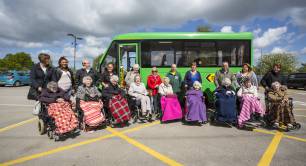Are the wheels coming off social enterprise buses?
Recently changes proposed by the Department of Transport have seen a robust response from the Community Transport Association.
But, writes Matt Townsend, maybe it's an opportunity for social enterprises to compete on a level playing field with commercial bus operators.
The community transport sector is present across the whole of the UK. It is a network of hundreds of not for profit organisations moving around thousands of people every day to all kinds of places including workplaces, hospitals, shops and schools.
The smallest organisations may be just one or two volunteers using their own cars to help a few people get around a local area. The larger ones have fleets of minibuses and larger buses and paid drivers.
There are several not-for-profit sectors where most organisations are social enterprises, even if they don't shout about it. Community transport is one such sector.
Most organisations don't think of themselves as social enterprises because of their histories as local charities, but most community bus operators will receive fares from passengers and other journeys will be paid for by contracts from the local council. The largest community transport operator, HCT Group, is one of the most inspirational and exciting social enterprises in existence.
I worked in the sector for three years, running a rural operator in Norfolk, and found it to be full of amazing people doing great things. I also found it in some ways to be frustrating as I felt the sector was sometimes holding itself back by a lack of vision and by outdated approaches.
However, the sector is about to face its biggest challenge yet. There have long been grumbles from taxi and bus operators about community transport organisations winning contracts against them in competitive tender situations. A small very vocal number have made these complaints more formal.
Their argument is that commercial minibus operators need to have a operator licence (known as a PCV) and all drivers need minibus driving licences and regular ongoing training.
The community transport sector has a different licensing regime (known as section 19/22) and most drivers take advantage of the fact that if they got their normal driving licence before 1997 it probably allows them to drive a minibus in a not-for-profit situation. This is why the age of drivers for community transport organisations is gradually increasing.
For many years community transport organisations have bid for contracts, mainly from councils, to provide transport to schools and day care centres, often transporting the most vulnerable of people. Some also provide regular bus services, particularly in rural settings, which are usually subsidised.
As the organisations are charities with no shareholders to make gains, they have used section 19/22 permits to carry out the contracts often with paid drivers who are able to drive minibuses.
In response to the complaints, the Department for Transport have sent sent a letter to the sector providing a new interpretation of the situation. The letter states:
"An operator whose activities are essentially those of a bus company (in that it employs salaried drivers and carries out passenger transport services under contracts won in contestable markets and/or in exchange for fares charged to passengers at more than nominal rates) cannot be regarded as carrying out its activities 'exclusively for non-commercial purposes'. That is so even if the operator is a registered charity or other 'not for profit' organisation."
The impact of this to the sector could be massive. Drivers may have to be made redundant, contracts may have to be given back to local authorities and some community transport organisations may no longer be viable.
To get each driver the full qualifications required I estimate would cost at least £1,500 per driver. Some drivers simply won't want to go through all this extra training and testing, and some may fail. The drivers who do pass will be able to command higher salaries and will find themselves targeted by bus and taxi operators to work on their contracts.
This means that contracts awarded to community transport operators may need to be re-tendered and will be awarded at a higher price. For some councils I estimate the financial impact to be in the millions.
Community transport operators who want to continue to run these services and require an operators licence will need a qualified transport manager and to start using tacographs and evidence certain amounts of reserves are in the bank depending how many vehicles they will operate.
For many operators who are run by voluntary boards and very small staff teams I think this will feel excessive and will see this as a time to pull out of contract work and become much smaller organisations running services just with volunteers.
The lack of clarification about this has hung over the sector for years now and most community transport organisations will have been aware they could have to pull out of these services at any point.
It will be painful, particularly for the passengers who are often groups of people who don't like change, for drivers who may lose jobs and for the councils who will see their transport budgets blown to pieces.
Opportunities
There is another side to this story. It's a side that I don't think the taxi and bus companies who have initiated the complaints have really thought through, and why I think they may regret their actions within a couple of years.
The letter from the DfT will cause a lot of stress but at least it does finally provide clarity. Some operators will need to substantially reduce in size and many probably should consider mergers, but the largest operators, such as HCT Group won't be affected by any of this as they will already operate most services under PCV licences.
This could also create a massive opportunity for a existing not-for-profit bus companies with PCV licences to grow, or for new social enterprises to come in to the market with the main aim of winning these contracts.
The prices of the contracts will, as a result of this clarification, need to rise and the paid drivers who get trained up will be able to earn higher salaries. This will put an end to the sector having to serve contracts at lower prices than commercial operators and will enable not-for-profits to pay the same salaries as the bus and taxi companies. There will therefore be greater competition for drivers with PCV licences.
The opportunities for social enterprises with PCV licences are massive because they can then compete directly with bus operators on all bus routes, not just those which are tendered by the local councils. So it may take a little while for the dust to settle but within the next few years we could see more challenges to bus companies from social enterprises as an indirect result of this.
There are also be strong opportunities for social franchising within the sector.
Social enterprise is all about turning challenges into opportunities, for the benefit of communities and society. Sometimes a level playing field is all that is needed.
Photo credit: Pexels/Negative Space



